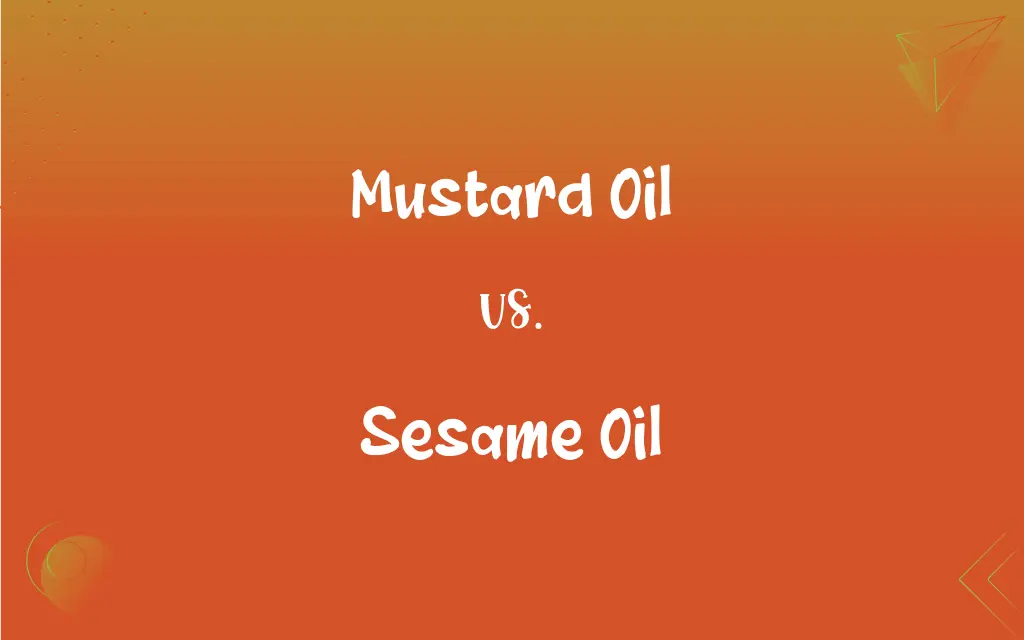Mustard Oil vs. Sesame Oil: What's the Difference?
Edited by Aimie Carlson || By Janet White || Published on November 27, 2023
"Mustard Oil" is pungent, made from mustard seeds, used in cooking, and massages. "Sesame Oil," from sesame seeds, has a nutty flavor and is used in various cuisines.

Key Differences
"Mustard Oil" is a type of oil derived from mustard seeds, known for its strong, distinctive pungent or spicy aroma and is popular in Indian and Bangladeshi cuisine. On the other hand, "Sesame Oil" is extracted from sesame seeds and is notable for its nutty, mild flavor and aroma, featuring prominently in Asian cooking, particularly Korean, Japanese, and Chinese.
When it comes to health benefits, "Mustard Oil" is high in monounsaturated and polyunsaturated fats and includes omega-3 and omega-6 fatty acids; it is also believed to have anti-inflammatory properties. In contrast, "Sesame Oil" is rich in linoleic acid and has a good balance of omega-6 and omega-9 fatty acids, known for their heart-health benefits.
In cooking, "Mustard Oil" often undergoes heat treatment before use, as its raw form contains erucic acid, considered harmful in large amounts. "Sesame Oil," especially the toasted variety, is used as a flavor enhancer due to its intense nutty taste and is seldom used as the primary cooking oil.
"Mustard Oil" has a more extensive application in therapeutic and medicinal use, often utilized in massages and believed to stimulate blood flow. However, "Sesame Oil" is also used for massages but is more prevalent in cosmetic applications, known for its moisturizing properties.
Both "Mustard Oil" and "Sesame Oil" have distinct smoking points. Mustard oil has a higher smoke point, making it suitable for frying and sautéing, while sesame oil, particularly the toasted variety, has a lower smoke point and is better suited for low-heat cooking or finishing oils to add flavor to dishes.
ADVERTISEMENT
Comparison Chart
Flavor/Aroma
Pungent, spicy
Nutty, mild
Health Benefits
Omega-3, omega-6, anti-inflammatory
Linoleic acid, omega-6, heart health
Cooking Use
Frying, sautéing, heat-treated
Low-heat cooking, flavor finishing
Non-Cooking Use
Therapeutic massages
Cosmetics, massages
Smoke Point
Higher
Lower (especially toasted variety)
ADVERTISEMENT
Mustard Oil and Sesame Oil Definitions
Mustard Oil
Used in cooking and therapeutic practices.
He used Mustard Oil for both frying and his daily massages.
Sesame Oil
Recognized for its nutty flavor.
The Sesame Oil gave the salad dressing a delightful nutty undertone.
Mustard Oil
Contains omega fatty acids and nutrients.
She chose Mustard Oil for its health benefits.
Sesame Oil
Used in cooking and skin care.
Besides cooking, she used Sesame Oil as a moisturizer.
Mustard Oil
Oil pressed from mustard seeds.
She added Mustard Oil for an authentic touch in her curry.
Sesame Oil
Rich in antioxidants and polyunsaturated fats.
Due to its nutrients, he incorporated Sesame Oil into his diet.
Mustard Oil
Known for its pungent aroma and taste.
The strong flavor of Mustard Oil was unmistakable in the dish.
Sesame Oil
Comes in different varieties, including toasted.
For a richer flavor, she bought toasted Sesame Oil.
Mustard Oil
Requires heating before use to deactivate toxins.
He always heats Mustard Oil to the smoking point before use.
Sesame Oil
Oil derived from sesame seeds.
She drizzled Sesame Oil over the stir-fry for added flavor.
FAQs
Is "Mustard Oil" good for hair?
Yes, it's traditionally believed to stimulate hair growth.
Can you fry with "Mustard Oil"?
Yes, it has a high smoke point suitable for frying.
Can "Sesame Oil" be used for oil pulling?
Absolutely, it's commonly used for this oral health practice.
Is "Mustard Oil" healthy?
In moderation, it offers a range of health benefits.
Why is "Mustard Oil" banned in some countries?
Due to its erucic acid content, considered harmful in large doses.
What's the smoke point of "Mustard Oil"?
It's relatively high, around 480°F (250°C).
How is "Sesame Oil" made?
It's extracted from sesame seeds, often cold-pressed.
Is "Sesame Oil" good for your skin?
Yes, it's known for its moisturizing properties.
Can "Sesame Oil" go bad?
Yes, like all oils, it can become rancid over time.
Should "Sesame Oil" be refrigerated after opening?
It extends shelf life, but it's not mandatory.
What cuisines commonly use "Sesame Oil"?
Asian cuisines, particularly Korean, Chinese, and Japanese.
Does "Sesame Oil" have a strong taste?
It has a noticeable nutty flavor, stronger in toasted varieties.
Is "Sesame Oil" used in desserts?
Rarely, but its nutty flavor can complement certain sweets.
Is "Sesame Oil" high in calories?
It's calorie-dense, like most oils, so use in moderation.
Can "Mustard Oil" be used for deep frying?
Yes, its high smoke point makes it suitable.
How should "Sesame Oil" be stored?
In a cool, dark place, tightly sealed to prevent oxidation.
What is "Mustard Oil" made from?
It's pressed from the seeds of the mustard plant.
Can "Mustard Oil" be used in salads?
Its pungent flavor can be a bold addition to dressings.
Does "Mustard Oil" need to be heated before use?
Heating to the smoking point deactivates harmful compounds.
Is "Mustard Oil" used in Ayurvedic practices?
Yes, extensively, especially for massages and treatments.
About Author
Written by
Janet WhiteJanet White has been an esteemed writer and blogger for Difference Wiki. Holding a Master's degree in Science and Medical Journalism from the prestigious Boston University, she has consistently demonstrated her expertise and passion for her field. When she's not immersed in her work, Janet relishes her time exercising, delving into a good book, and cherishing moments with friends and family.
Edited by
Aimie CarlsonAimie Carlson, holding a master's degree in English literature, is a fervent English language enthusiast. She lends her writing talents to Difference Wiki, a prominent website that specializes in comparisons, offering readers insightful analyses that both captivate and inform.






































































